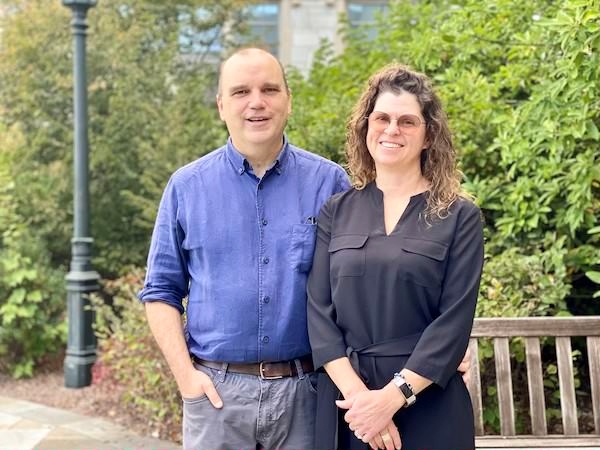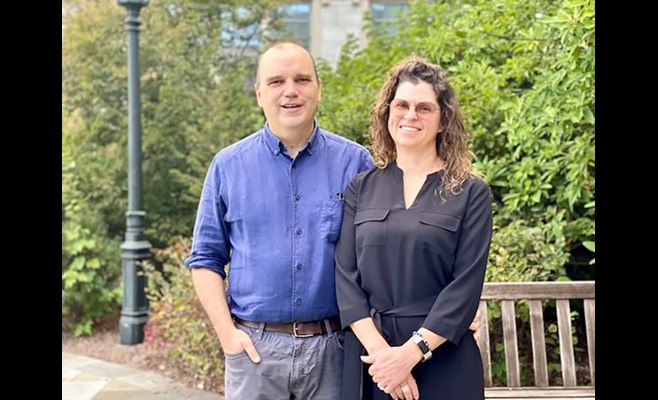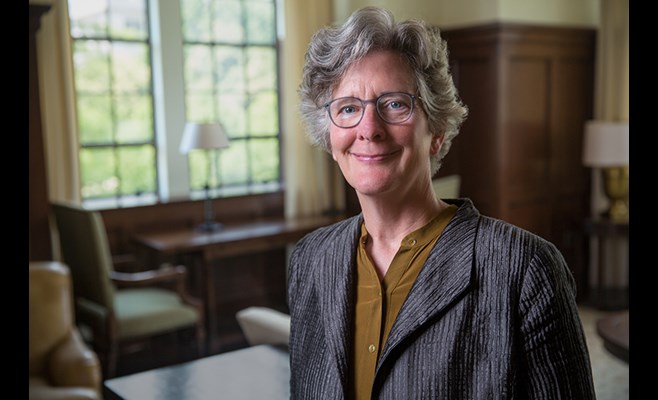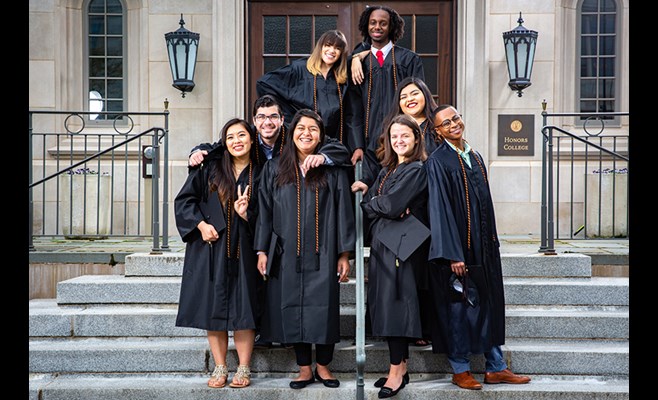
FAYETTEVILLE, Ark. – Lynda Coon, Honors College dean and professor of history, has pledged $30,000 in support of the Honors College Path Program. Professors Michael Pierce and Tricia Starks have also pledged $30,000 in support.
“I’m delighted to support our Path Program, which has a proven track record in recruiting and graduating top students from underrepresented groups,” Dean Coon said. “And with a five-year pledge, a major gift is within reach of far more people than you might think. This gift will keep having an impact on an important Honors College program for many deans to come.”
Both pledges will be paid by monthly payroll deduction over five years, showing how an endowed gift is in closer reach than most people realize.
The Honors College Path Program prepares exceptional high school students from underrepresented populations (first-generation, significant financial need or geographic area of the state that is less well-represented) to excel at the University of Arkansas. Students are paired with peer and professional mentors to help make the most out of the college experience, and the program encourages academic success and leadership development for each student.
Established in 2014, the program boasts a 91 percent on-time graduation rate since its first group graduated in 2018.
Pierce and Starks, whose son received a $72,000 Sturgis Fellowship, said that this is the least they can do in return.
“He’s so lucky to be here,” Starks said. “He’s worked hard, but he’s had advantages that others haven’t. We hope this endowment will be a way to recognize this and help others come to the university.”
“We’ve seen the ways that the Path program has transformed the lives of these incredible students who otherwise might not have had these opportunities to succeed,” Pierce said. “In many ways, the Path program is what our nation is about. It’s providing opportunity for everyone, and not just wealthy kids and the elite.”
Pierce and Starks chose to name their endowed award after Starks’s grandmother, Rubye Starks, whom she describes as “one of 12 kids from a small Missouri town who never got to finish school, but always thought that education was the most important thing, … along with a good martini.” Starks continued, “By the time of her death, she had traveled enough to circle the world three times. To us, she seemed like a good Path icon.”
The Path Program has received close to $2 million in National Science Foundation grants to recruit STEM students and foster entrepreneurial endeavors, and more than $6.5 million from from private donors and foundations, including $5.5 million from the Walton Family Charitable Support Foundation. Private support has made it possible to offer Path scholarships to students pursuing degrees in all majors.
Dean Lynda Coon earned a bachelor’s degree in history at James Madison University and master’s and doctoral degrees in history from the University of Virginia.
Her research focuses on the history of Christianity from circa 300-900. She is a member of the University of Arkansas Teaching Academy and has received three top teaching honors at the university: the Fulbright College Master Teacher Award in 1998, the Charles and Nadine Baum University of Arkansas Teaching Award in 2000, and the University of Arkansas Honors College Distinguished Faculty Award in 2014.
Under her leadership, the Honors College has launched a robust series of interdisciplinary seminars led by the university’s top faculty and administrators.
Tricia Starks received both her M.A. and Ph.D. in history from Ohio State University. She currently researches tobacco use alongside other issues of health in the Soviet Union and Russia in the late 20th century.
She served as the history department’s director of graduate studies and associate chair from 2012-15 and is currently the director of the University of Arkansas Humanities Center.
She has received Fulbright College Master Teacher and Master Researcher Awards, a NEH/NCEEER Collaborative Research Fellowship, and NIH/NLM Grant for Scholarly Works in Biomedicine and Health and was named a University of Arkansas Student Alumni Board Teacher of the Year.
Michael Pierce received both his M.A. and Ph.D. in history from Ohio State University. His current project looks at race and the labor movement in postwar Arkansas, with a particular emphasis on Little Rock‘s Central High crisis.
He serves as associate editor of the Arkansas Historical Quarterly. He received the Oustanding Faculty Member of the Year Award from the Graduate Professional Student Congress in 2020, the Omni Center for Peace, Justice and Ecology Award in 2014, a Fulbright College Master Teacher Award in 2013 and a Connor Endowed Faculty Fellowship in 2011. He has been a member of the University of Arkansas Teaching Academy since 2013.
About the Honors College: The University of Arkansas Honors College was established in 2002 and brings together high-achieving undergraduate students and the university’s top professors to share transformative learning experiences. Each year the Honors College awards up to 90 freshman fellowships that provide $72,000 over four years, and more than $1 million in undergraduate research and study abroad grants. The Honors College is nationally recognized for the high caliber of students it admits and graduates. Honors students enjoy small, in-depth classes, and programs are offered in all disciplines, tailored to students’ academic interests, with interdisciplinary collaborations encouraged. Fifty percent of Honors College graduates have studied abroad and 100 percent of them have engaged in mentored research.
About the University of Arkansas: The University of Arkansas provides an internationally competitive education for undergraduate and graduate students in more than 200 academic programs. The university contributes new knowledge, economic development, basic and applied research, and creative activity while also providing service to academic and professional disciplines. The Carnegie Foundation classifies the University of Arkansas among fewer than 3% of colleges and universities in America that have the highest level of research activity. U.S. News & World Report ranks the University of Arkansas among its top American public research universities. Founded in 1871, the University of Arkansas comprises 10 colleges and schools and maintains a low student-to-faculty ratio that promotes personal attention and close mentoring.
Topics
Contacts
Hiba Tahir, editor
Honors College
479-575-7678,
John Treat, director of development
Honors College
479-575-6775,


